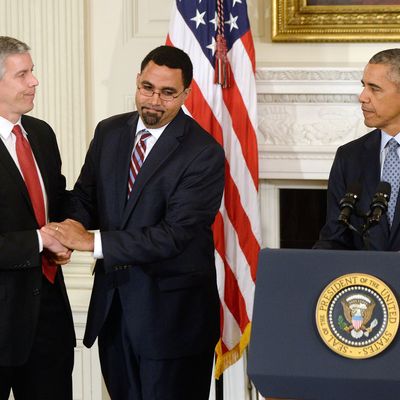
Last week, Secretary of Education Arne Duncan announced his resignation, after nearly seven years in office where he advanced the cause of education reform and served as the subject of weirdly displaced anger from the teachers unions and their allies. The Obama administration pushed hard for education reforms bitterly opposed by the unions. Obama supported education reform even before his presidential campaign, even sponsoring a 2006 bill that presaged the reforms he would go on to implement as president. But unions have always found it inconvenient to identify Obama as their opponent. Many teachers trust and even adore Obama, and forcing them to choose between Obama and the union ran the risk of driving many of them away from the union.
Thus Duncan has served as the outlet for their frustration. Last year, the National Education Association called on Duncan to resign, as though Duncan were a rogue agent carrying out a personal agenda behind Obama’s back. In a new item denouncing the administration’s reforms, Charles Pierce has a wonderfully characteristic passage: “when the history of the Obama Administration is written, its willingness to go along with charter-school grifters at the behest of Arne Duncan is going to be a very big debit on the ledger.”
Pierce does at least acknowledge Obama’s culpability in own administration’s education agenda. But note Pierce’s language. He accuses Obama of a “willingness to go along” with the education-reform movement — as opposed to an active desire to champion its goals, he is merely along for the ride. Nobody ever says that Obama has “gone along with” health-care reform or the Clean Power Plan. The next part of Pierce’s sentence is even more remarkable. He claims Obama has done so “at the behest of Arne Duncan.” “At the behest” means following orders from that person. Pierce is literally accusing Obama of carrying out demands imposed upon him by his secretary of Education. That is not how the executive branch works.
Now, there is a good chance Pierce does not actually intend to say what he wrote and that he merely followed the momentum of his own rhetoric to its conclusion without contemplating its meaning. But if you correct that part, so that it says Duncan implemented education-reform policies at the behest of President Obama, then it would make a hash of Pierce’s point.
Meanwhile, Duncan’s replacement, John King, is at least as committed as Duncan to the reform movement. Imagine — yet another reformer has somehow seized control of the Education Department behind Obama’s back. Who knows what sinister agenda he will force Obama to go along with?






























